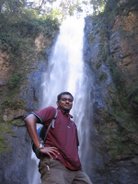Just want to share this with everyone. Fadlee, who is a UPM scholar, is currently doing his PhD at Loughborough University. He's due for his viva next week, and will get his doctorate degree by next month.
____end___
THE MOBILE PHONE WITH VITAL SIGNALS
BY HANNAH DAVIES
10:30 - 06 October 2005
It's taken years to perfect, but patients could soon benefit from a gadget which keeps tabs on their health through their mobile phone.
Professors at Loughborough University have invented the system, which uses a mobile phone to transmit a person's vital signs to a hospital computer.
Doctors can monitor heart signals, blood pressure, oxygen saturation and body temperature of patients miles away.
It means that patients in rural areas could be monitored without having to book hospital trips.
Sensors attached to the patient's wrists are used to transfer the signals via a mobile.
Professor Bryan Woodward and Dr Fadlee Rasid from the university's department of electronic and electrical engineering, created the device.
Prof Woodward said: "The idea is that a doctor can monitor a patient who can be anywhere, perhaps hundreds or thousands of miles away, and they can speak to each other at the same time.
"When the new system is fully developed its main use will be in healthcare, where the technology could improve the quality of life of patients, particularly for those undergoing post-operative care or living remotely from a hospital.
"It will allow medical services to be delivered to any location within the coverage of cellular networks.
"A patient from a rural area can be given a check-up by mobile phone without having to commute regularly to a hospital.
"Routine inspections and monitoring could be done while the patient is at home, travelling, at work or at leisure, relieving resources for more demanding hospital cases."
The university was given a £160,000 grant to develop a prototype of the system. After seven years in the pipeline, it has now been tested successfully under realistic conditions.
The technology is thought to be a world first. Although landline phones can already be used to transfer vital signs, a mobile increases freedom for patients.
Prof Woodward said: "I came up with the idea after thinking there was no reason why a mobile phone couldn't be used for this. We thought we'd just go for it.
"Fortunately, the only limitations appear to be the temporary loss of mobile phone signal when going through a tunnel, or other areas not covered by a mobile network"
Heart patient Mabel Johnson, 100, who lives in the city centre, said: "I think it sounds like a very good idea. It's much better for people who go to hospital to have their heart signals checked to get it done without leaving the house, or if they were on holiday they could be checked without having to cut their trip short."
At Loughborough University, the system will also be used in the area of sport and exercise. In the build-up to the 2012 Olympics, the technology would allow coaches and physiologists to monitor performance of athletes remotely, and the data could be stored for later analysis.
Sunday, October 09, 2005
Subscribe to:
Post Comments (Atom)

No comments:
Post a Comment